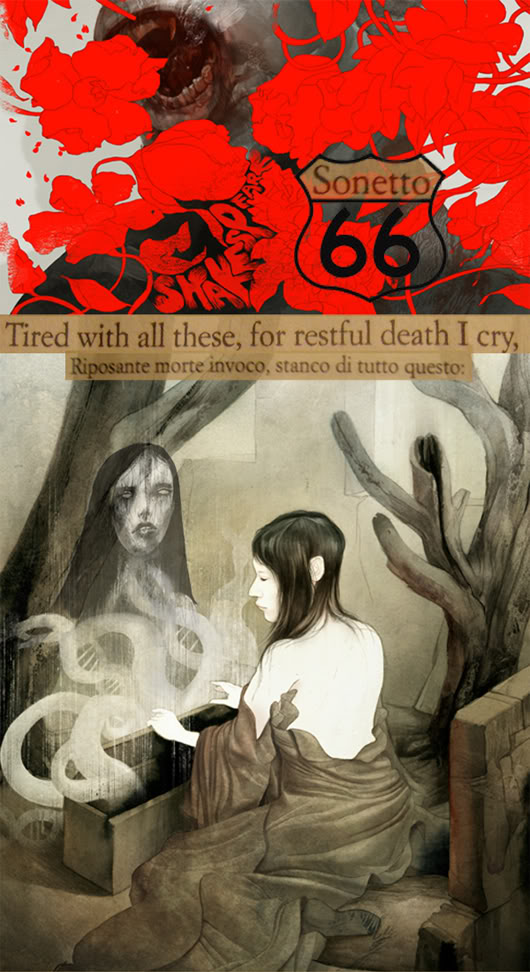Different from other sonnets which mostly deal with the personal issues like love, beauty, friendship, jealousy, time, and hope, sonnet 66 mainly talks about the speaker’s concerns of the social issues. We can almost feel the world-weary, tired, and angry tone of the speaker. In the first line, the speaker says he is “tired with all these” and he must cry out for his “restful death”, which reveals his desire to cry out and we may deduce that other people at that time look on these things with cold indifference. This line also suggests that he is so desperate that he is willing to die.
So what are the social issues which upset him so much The following 10 consecutive lines begin with the conjunction word and, which is really unique and eye-catching. He is upset to see a meritorious man born poor and destitute, which at that time means the person is deprived of the chance to success and happiness. He is upset also to see the unworthy flourishing of the country he lives, which suggests that the country has commits too much sins that it is unworthy of flourishing. He is angry and depressed to see the purest faith being unfortunately betrayed; the wrong people being bestowed with golden-appearing rank or position; the virtuous maiden being violently abused; the beauty being demeaned; the strength being disabled by limping power; sciences and arts tongue-tied by authority; pretentious stupidity control intelligence while honest innocence being regarded as ignorance; and goodness being imprisoned and waiting upon great evil.

These unfair social issues are still happening nowadays. So these beautiful and yet thought-provoking lines can still be applied to our society as well. From these lines, we can imagine the social circumstances at that time. It also reminds me of the famous soliloquy by hamlet, which also reveals the concerns of Hamlet about his own country and people:
Must give us pause: there's the respect
That makes calamity of so long life;
For who would bear the whips and scorns of time,
The oppressor's wrong, the proud man's contumely,
The pangs of despised love, the law's delay,
The insolence of office and the spurns
That patient merit of the unworthy takes,
When he himself might his quietus make
With a bare bodkin? who would fardels bear,
To grunt and sweat under a weary life,
But that the dread of something after death,
The undiscover'd country from whose bourn
No traveller returns, puzzles the will
And makes us rather bear those ills we have
Than fly to others that we know not of?
Maybe we can deduce from this soliloquy and sonnet 66 that the author concerns a lot about his country and people.
In the last couplet, which is always about the main theme of the poem, the speaker expresses, however, that he is so tired of all of these things but he won't go die, because he would not leave his lover all alone. We can see that this ending also echoes with the beginning, where the speaker cries for a restful death Meanwhile, this is a punch-line, which makes the previous lines all the foreshadowing of his love towards the young man. It seems that the speaker lives for his lover's sake, while actually his lover has saved him. Therefore, we may say that the speaker is expressing his love as well as gratitude toward the young man.
However, as far as I am thinking, the social issues he list are also of equal importance with his feelings to the addressee. The speaker concerns about the sufferings of the poor people and is angry with the unjustified welfare of the undeserving people. While at the same time, we may deduce from some of the lines that the speaker is also one of the victims of the unjustified social system, for instance, art made tongue-tied by authority and captive good attending captain ill Therefore, the speaker is at the same time lamenting his own fate.

